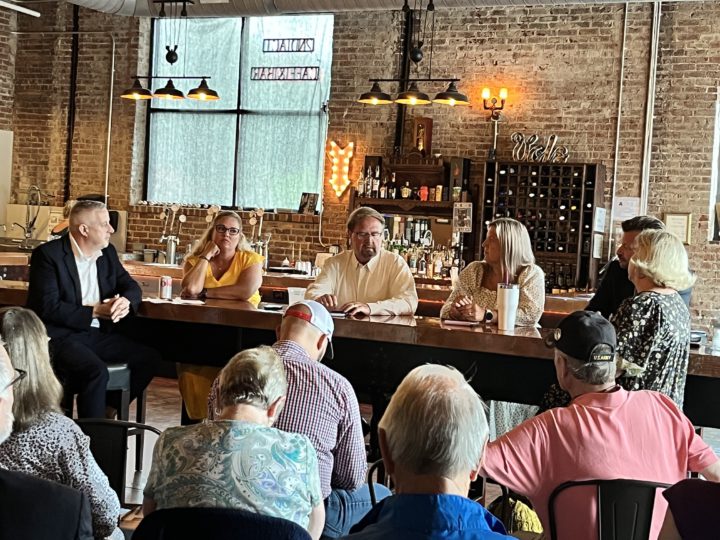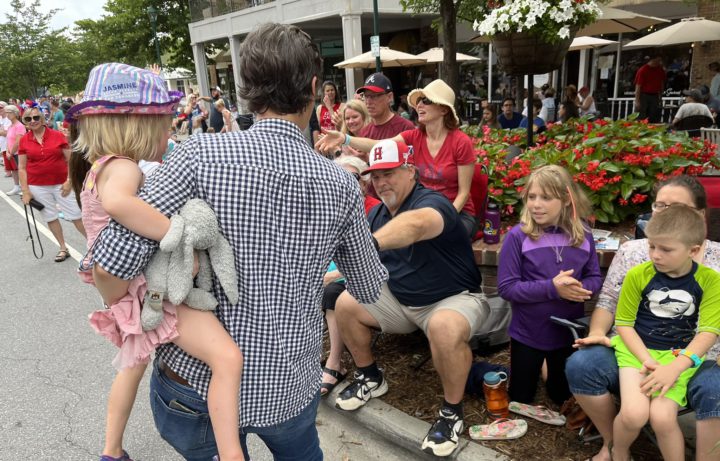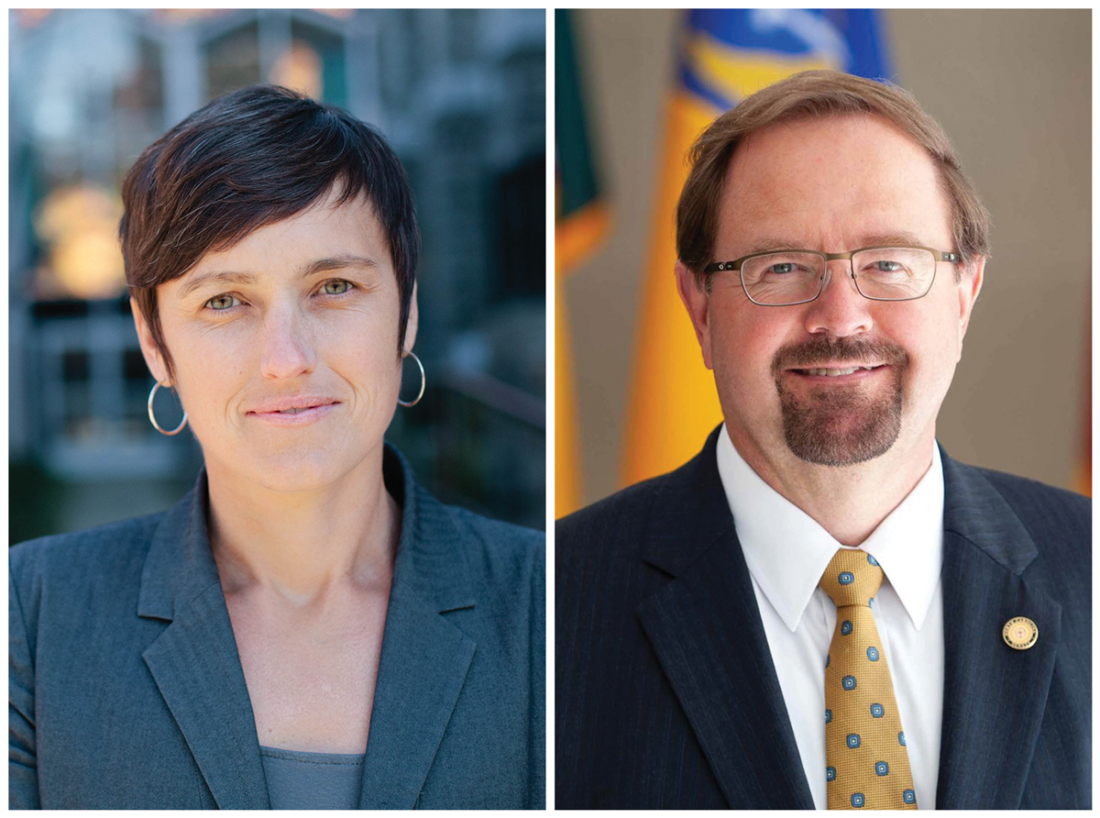For a brief moment in May, an erstwhile used car dealership in Hendersonville became the center of Western North Carolina’s political universe. Reporters from across the region — and even a photographer for The New York Times — descended on 924 Asheville Highway the night of May 17.
It was there that Madison Cawthorn, WNC’s Republican representative in the U.S. House, was holding a watch party to see primary election returns come in. And it was there that Cawthorn conceded to Chuck Edwards, a state senator for Buncombe, Henderson and Transylvania counties, after losing the Republican nomination by nearly 1,400 votes.
Media outlets from NBC News to PBS to The Associated Press proceeded to cover Cawthorn’s defeat, with many noting the freshman congressman’s role in events at the Capitol on Jan. 6, 2021, and endorsement by former President Donald Trump. That national attention on North Carolina’s 11th Congressional District quickly waned, but for WNC voters, a new story was just beginning.
In the general election, Edwards is trying to unite Republican voters after a bitterly fought eight-way primary in which he received just over a third of the vote. His Democratic challenger, Buncombe County Commissioner Jasmine Beach-Ferrara, must convince voters who haven’t elected a Democrat to Congress since former Rep. Heath Shuler in 2010 that now is time for a change. (Libertarian candidate David Coatney, a marketing professional and filmmaker, is also taking his chances in a district that has never given a third-party option more than roughly 2% of the vote.)
With two months to go until Election Day on Tuesday, Nov. 8, Xpress took a look at how the two major-party campaigns are handling their unique challenges.
On the trail
On the Democratic side of the ballot, the party’s District 11 chair, Matt Ballance, says that in-person events are critical for voter outreach. While such gatherings are always important, he says, they take on added urgency after two long years of COVID-19 restrictions.
“We had a hard time [connecting with voters] in 2020 because of COVID and trying to keep people safe,” Ballance admits. “Politics is built on relationships; relationships are built on trust. And trust is only built when two people are able to communicate and feel heard and validated. If candidates and party volunteers are out in the field listening to voters and making them feel valued and heard, that lends itself much more to that voter being persuaded to trust and vote for that candidate or party than a social media post.”
“We have been out campaigning in every county, in every corner of the district, for the last year and a half, and are doing even more so now,” adds Beach-Ferrara. “We’re seeing packed rooms — whether we were in McDowell County or Jackson County — everywhere we’re going, we’re seeing a lot of folks turning out.”
Edwards is also taking to the road, but many of the events he’s chosen to attend appear targeted to shore up support among his party. On Aug. 17, he was the featured speaker at a Hendersonville panel discussion hosted by the N.C. Republican Party; Edwards also spoke at the campaign kickoff for fellow Republican state Sen. Kevin Corbin and is slated to attend a barbecue fundraiser for Corbin in Franklin.

Following the Aug. 17 event in Hendersonville, Edwards told Xpress that he planned to “run a grassroots campaign,” and meet as many voters as possible. “[I plan] to hear concerns of voters and hear solutions that they have, and to talk about how my views, in my experience, will perhaps align with what they tell me,” he explained.
Edwards has been less eager to attend debates or forums with his opponents. According to an Aug. 10 story in the Smoky Mountain News, the Republican announced he would only participate in one joint candidate appearance and would skip an Aug. 31 debate hosted by the paper with Blue Ridge Public Radio. Nancy Waldrop, president of the Leadership Asheville Forum, says her group canceled a planned late September forum of NC-11 candidates after the Edwards campaign declined the invitation.
“What we’re seeing from him is a clear pattern of avoiding voters and avoiding the very real, very honest conversations that the voters of Western North Carolina deserve to have with anyone who’s running for office,” Beach-Ferrara says of Edwards. “In many ways, the campaign is the process of applying for a job, and that means showing up and answering questions about how you’ll do that job.”
Edwards did not respond to a request for comment regarding his decision to skip the debates before press time. John Anglin, the NCGOP’s District 11 chair, says the candidate has committed to a debate hosted by Asheville TV station WLOS, the details of which have yet to be determined.
Through the party lens
Even without a debate between the candidates, their different approaches to the issues facing WNC are becoming clear as the campaign wears on. Edwards and the GOP are focusing attention on matters at the national level, while Beach-Ferrara and the Democrats are emphasizing issues with specific regional ties.
Among the priorities listed on Edwards’ campaign website are “securing our border,” “energy independence” and “empowering parents” to take more control of their children’s education. The candidate is also focusing on the national economy and what he alleges to be its mismanagement by Democratic leaders.
“Folks are telling me that they’re tired of politics as usual, that the American family is in dire straits right now with the inflation imposed on them by the Biden administration,” Edwards told Xpress.
“Specifically it’s the impact of higher living costs for constituents in WNC and throughout the state and nation,” adds Anglin. He says the Build Back Better policies championed by President Joe Biden have substantially boosted prices for food, energy and gasoline in particular.
In contrast, Ballance says Beach-Ferrara and other Democrats are working to show voters how their party’s policies might improve local quality of life. Increased infrastructure investment, for example, could provide more connectivity for WNC communities with poor broadband internet access, while higher federal education spending could help address local concerns over teacher retention.
“I think what really is making an impact here in Western North Carolina with voters are things that are tangible, they can actually touch and see making a difference in their day-to-day lives,” says Ballance.

But Beach-Farrara adds that her campaign is also engaging with national trends. She says she aims to offer an antidote to what she feels are deep partisan divisions and rhetoric that has dominated politics in recent years.
“People are sick and tired of the politics of division and the toxic extremism that we have gotten from Madison Cawthorn and [former Republican representative and White House Chief of Staff] Mark Meadows before him,” Beach-Ferrara says. “And now, Chuck Edwards is running to continue the tradition.”
Changing lines and affiliations
The two campaigns are playing out on territory different from that of previous election cycles. The district lines that were drawn following the 2010 census (and which were ultimately thrown out due to litigation around Republican lawmakers’ engagement in gerrymandering) divided Asheville and Buncombe County between Districts 10 and 11, diluting the area’s heavily Democratic vote. New district lines established this year, however, place all of Asheville into NC-11 and narrow that Republican advantage.
According to political analysis website FiveThirtyEight, the new 11th District has a 14-point partisan lean in favor of Republicans. The previous lines gave Republicans a 16-point advantage, which the website classifies as “solid Republican” rather than “competitive.”
“This is the first time our district has had fair lines in more than a decade. And that’s really significant. If this district had existed in the 2020 election cycle, [Gov.] Roy Cooper would have lost [the district] by only 4 points or 17,000 votes,” Beach-Ferarra says. “So we’re looking at a district that has the potential to be very competitive.”
Also new this cycle is the plurality of unaffiliated voters in the district. As of press time, approximately 238,000 NC-11 voters were not aligned with any political party, compared with about 200,000 registered Republicans and 165,000 registered Democrats.
Anglin says that the NCGOP’s messaging will remain the same, regardless of which party (or lack thereof) voters are affiliated with. He says current economic issues impact people across the political spectrum.
“Whether they’re in poverty or whether they’re upper class, they’re being impacted in such a negative way by the economy right now,” he says. “For the unaffiliated voters that I encounter, those are the real areas that are of interest to them.”
On the ground
Voters who spoke with Xpress tended to have mixed feelings or tepid views of the candidates they planned to vote for in the general election.
Unaffiliated voter and Barnardsville resident Eddie Harwood says he’s looking for politicians on either side of the political spectrum to rein in government spending and respond to the local needs of their constituents. He says that he has supported Democratic candidates in the past but that he plans to vote for Edwards this fall.
While he has heard chatter among friends and neighbors who feel less than enthused about Edwards, he feels it’s time for voters to coalesce around the Republican nominee. “This ain’t the time to protest. The time to protest was during the primaries,” Harwood says. “Now we’re going into the general [election] and we better figure it out.”
Asheville resident Will Overfelt, a registered Democrat who says he’s likely to become unaffiliated after this fall’s election, says that health care and affordable housing are the most important issues facing WNC residents today. He says he initially supported Democrat Katie Dean in the primary because of her independent and pragmatic leanings.
Asked whether he is feeling less motivated to vote or participate following Dean’s loss in the primary, Overfelt notes that it’s not an easy answer.
“Yes, I will gladly vote for [Beach-Ferrara] and I have sent her a few dollars when I can,” he says. “I hope she wins. She’s not a candidate who inspires me, but I know she inspires others, so I’m hopeful.”
Dean, for her part, says that she plans to continue working to unite Democratic voters following the primary. “I remain willing to help in any way I can,” she tells Xpress.
As Election Day approaches, both candidates say that they’re feeling optimistic about the road ahead.
“I think there’s a good strong sentiment in Washington right now to stop the Biden inflation and to close the border and get crime under control in this country,” Edwards says. “We need to give power back to the parents for their children’s education to create a level of national security, beginning with economic strength.”
“Our biggest challenge is making sure that we’re doing everything we can to turn out the kind of vote that is absolutely possible in a midterm cycle. When you’re running in a midterm, there can be drop-offs in turnout,” Beach-Ferrara says. “There is so much on the line and so much at stake.”
Registered voters can begin early voting by mail Friday, Sept. 9, with in-person early voting available from Thursday, Oct. 20, through Saturday, Nov. 5.
With additional reporting by Jessica Wakeman




Have we heard what Jasmine has to offer the hard working TAX payers and property owners in the District ? It’s always amusing to hear what democrackkks offer up…
I will be voting for Farrara and hoping she can pull off a miracle victory. However, giving credit where credit is due requires that I at least acknowledge in passing that Edwards had the cajones to challenge the, “crypto-fascist, Trump-thumping, boy-toy,” Cawthorn, at a time when just about every other major Republican cowered, despite knowing full well what a disaster he was for the district and for any kind of remotely democratic norms.
Edwards was the hand-picked choice of the GOP cabal in Raleigh and Tom Tillis. They wanted Cawthorn out -badly- because he was making them -the NC GOP- look so very bad. Edwards is a total Trumper fascist sleazeball. period.
It may be a distinction without a difference in your view, but I interpret things differently. Cawthorn is an avowed crypto-fascist, openly calling for a “Dark Maga” reckoning for any and all who oppose Trump, and is a very real threat to democratic norms and values. He also consistently voted against the interests of his district even when it came to less partisan or divisive economic and spending issues. He actively sought to be in the ranks of those like Gohmert, Gosar, Boebert, Taylor Greene, & Gaetz, who are bound by deeper conviction to the abhorrent form of right wing nationalism plaguing this nation.
For Edwards’ part, while “owning the libs” is certainly part of his stock-in-trade rhetoric, and while his positions and votes on policy usually line up in diametric opposition to what my own would be, his brand of conservatism abides by at least some of the norms and boundaries of democratic governance, and he will at least support the odd revenue bill which promises to bring resources to some of his constituents. And when NC House Speaker Tim Moore went running to hide in the bushes, rather than dare cross Trump’s endorsed candidate, Edwards and his backers were willing to do so. So, in the end, one (Edwards) is mostly an avowed opponent on matters of policy, and the other (Cawthorn) is an actual threat to the Republic – and that is a distinction worth making.
‘she is not a candidate that inspires me’ said Will Overfelt about JASMINE …
So what?
Could the Democrats have fielded a more mainstream, even conservative Democratic candidate, along the lines of Heath Shuler, which might have given them a better chance to beat Edwards? Were there Democratic candidates from Edwards’s home territory of Hendersonville?
Good question. I felt that Katie Dean fit that bill.
Thank you for that reminder.
No.